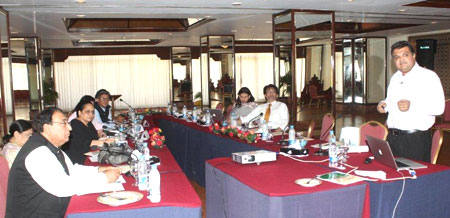| |
June 12; In a bid to promote targeted study and scrutiny of departmental budget by Standing Committees, PILDAT held special briefings today for the Standing Committee on Education and Standing Committee on Health on the Punjab Provincial Budget on Education 2012-2013 and Punjab Provincial Budget on Health 2012-2013 respectively. |
|
| |
In keeping with regional and international practices of effective budget scrutiny by public representatives at the Committee level, PILDAT has been demanding that the national and provincial assemblies of Pakistan allow for Standing Committees to review their respective ministerial budgets each year during the budget sessions. Despite public commitments by the Prime Minister of Pakistan and his respective Finance Ministers, as well as the Chief Minister Punjab, the 5th and final budget sessions of the on-going term of the National Assembly and the Provincial Assembly of the Punjab are continuing without allowing Standing Committees of the two legislatures to scrutinise their ministerial/departmental budgets.
|
|
| |
Control over the purse strings is one of the most crucial powers of elected representatives. Until the National and Provincial Assemblies pass the annual budgets, National and Provincial Governments can not spend any monies. However, very little time and powers are available to the National and Provincial Assemblies to influence the Budgets or to scrutinise these thoroughly before the passage. |
|
| |
PILDAT�s study of the average time National Assembly has spent during the past 10 years reveals a dismal 12 days each year on Budget Session. In comparison, the Provincial Assembly of the Punjab spends only 5 days at an average every year in general discussion on the budget. |
|
| |
Undeterred by the lack of opportunities provided by the Assembly secretariat, the Punjab Assembly Standing Committee on Education and Health wanted to scrutinise their respective ministerial budgetary allocations. Responding to this, PILDAT organised detailed briefings on Education and Health. |
|
| |
Very ably and meticulously delivered by Mr. Nohman Ishtiaq, Public Finance Management expert, the two briefings respectively analysed the main outlay of the Education and Health budgets of the Punjab Government in relation to the specific requirements of the province. Members of the Standing Committees on Health and Education were briefed on how to analyse the budgets in detail and what are some of the critical questions that the committee members and MPAs can raise during the budget discussion in the Punjab Assembly. |
|
| |
During the briefings, it was underscored that Pakistan is one of the very few countries where Government still has the power to spend more than the allocated budget as supplementary budget without the prior approval of the legislature thus rendering the entire budget process a meaningless exercise. |
|
| |
The budget analysis briefings were organised by PILDAT under the Parliamentary and Political Party Strengthening Project II which is funded through Canada's Department of Foreign Affairs and International Trade (DFAIT). The project is implemented jointly by the Parliamentary Centre, Canada and PILDAT. |
|
| |
|
|
| |
|
|
| |

|
|
| |
|
|
| |

|
|